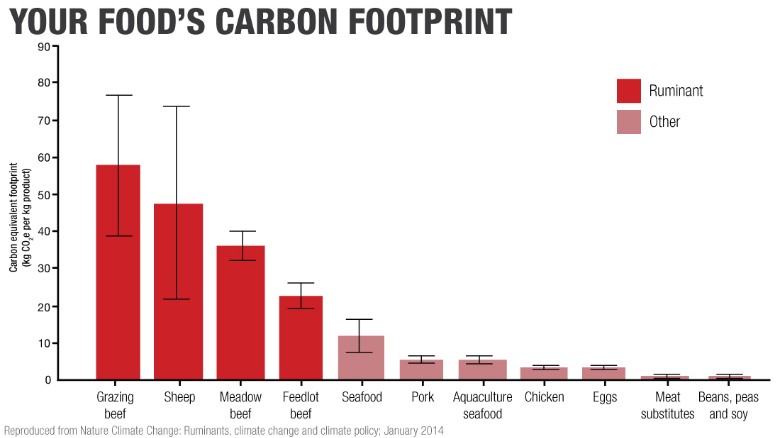WHY I BECAME A VEGETARIAN (AND WHY WE SHOULD ALL EAT LESS MEAT)
Good For All News - JANE SAYS

BY JANE GOODALL ON APRIL 28, 2017
Recently, the German Minister banned meat at official functions (HuffPo). Additionally, Portugal just passed a law which requires public cafeterias to offer at least one vegan option, applying to prisons, schools, universities, hospitals and other public buildings (Care2). Some people may be asking, ‘Why all this fuss?,’ but as we approach the People’s Climate March this Saturday Apr 29th (of which I was a participant in 2014) and on the coattails of this year’s Earth Day, there are many pressing reasons why what we eat is a major factor in our health and the health of the world along with all of its biodiversity.
People today are eating more and more meat, and it is becoming more and more of a problem. In countries where people are enjoying greater wealth, meats on the table can be a symbol of prosperity. Yet, few people pause to consider the harmful consequences of heavy meat eating. Years ago, that great Hungarian philosopher of science, Ervin László, said that heavy meat eating was a crime against the future of humanity. How far sighted was that remark.
There are three main reasons why we should eat less – or preferably no – meat. Firstly, so that we may eliminate factory farms. Secondly, to reduce the shocking damage the meat production industry inflicts on the environment and its contribution to climate change (The Guardian). And finally, to improve human health.
Most people do not realise the unspeakable cruelty suffered by animals on our factory farms. And some who know, do not really care. People have said to me that, after all, the animals are bred for food – as though this means that they are no longer sentient beings. Others beg me not to tell them about it, as they love animals and are very sensitive – so they can go on eating pigs and cows without feeling guilt. I stopped eating meat some 50 years ago when I looked at the pork chop on my plate and thought: this represents fear, pain, death. That did it, and I became an instant vegetarian. Other people will eat only the flesh of free range animals that live on farms, where they are well treated and know a quick death.
When I stopped eating meat I immediately felt better, lighter. Many people have told me the same. The adverse effects of too much red meat are well known (Harvard), and meat consumption certainly plays a role in the global rise in obesity (Science Daily). In addition some of the hormones and other supplements fed to animals to increase growth rate may be passed on to us (Washington Post). Antibiotics are now supplied on a regular basis just to keep animals alive in the crowded and depressing conditions in the factory farms. Inevitably bacteria are building up resistance, and people have already died from simple infections that refused to respond to the antibiotics meant to cure them (Consumers Union).
The effect of our modern meat production on the environment is truly terrifying. For one thing, huge areas of forest are cut down to grow the grain to feed the billions of animals we eat each year, or to provide grazing (Mongabay). This releases CO2 into the atmosphere, the main component of the greenhouse gases that are causing climate change. The droughts caused by climate change that are getting worse in sub Saharan Africa are quickly reducing traditional grazing areas to dusty, eroding deserts (Unicef). Huge amounts of water are wasted to transform vegetable protein into animal protein (TIME). Surface water is shrinking, and underground aquifers are shrinking too, (EPA) and becoming polluted, often from the runoff from agricultural chemicals or the “lagoons” of animal waste produced by the animals themselves. Then we must consider the large quantity of methane produced by the digestive systems of the animals, especially cows – a much more potent greenhouse gas than CO2 (EPA). And finally, the vast amounts of fossil fuels used to keep the whole meat producing industry operational is adding enormously to the greenhouse gases (One Green Planet).
For all of these reasons, and more, I chose to become a vegetarian all those years ago. I continue to ask people to consider what this choice really means on a moral and practical level for animals and the environment. It is the choice to change our individual lives, which will in turn have enormous benefits for all of humanity and all of the other living creatures we share our home with.
You can make a difference and eat with care - for yourself, animals and the planet! Check out our Eat With Care campaign for more infomation.
